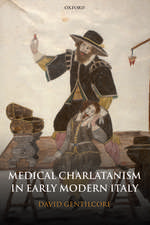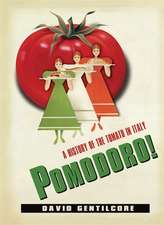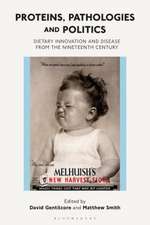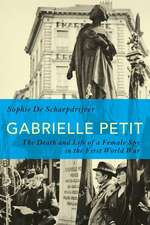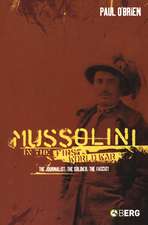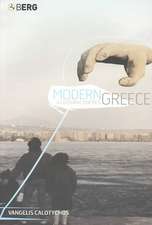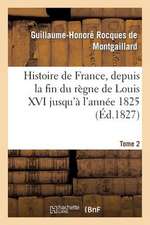Food and Health in Early Modern Europe: Diet, Medicine and Society, 1450-1800
Autor Professor David Gentilcoreen Limba Engleză Paperback – 18 noi 2015
| Toate formatele și edițiile | Preț | Express |
|---|---|---|
| Paperback (1) | 219.39 lei 43-57 zile | |
| Bloomsbury Publishing – 18 noi 2015 | 219.39 lei 43-57 zile | |
| Hardback (1) | 715.73 lei 43-57 zile | |
| Bloomsbury Publishing – 18 noi 2015 | 715.73 lei 43-57 zile |
Preț: 219.39 lei
Preț vechi: 246.29 lei
-11% Nou
Puncte Express: 329
Preț estimativ în valută:
41.98€ • 43.94$ • 34.94£
41.98€ • 43.94$ • 34.94£
Carte tipărită la comandă
Livrare economică 31 martie-14 aprilie
Preluare comenzi: 021 569.72.76
Specificații
ISBN-13: 9781472534972
ISBN-10: 1472534972
Pagini: 264
Ilustrații: 30 bw illus
Dimensiuni: 156 x 234 x 15 mm
Greutate: 0.43 kg
Editura: Bloomsbury Publishing
Colecția Bloomsbury Academic
Locul publicării:London, United Kingdom
ISBN-10: 1472534972
Pagini: 264
Ilustrații: 30 bw illus
Dimensiuni: 156 x 234 x 15 mm
Greutate: 0.43 kg
Editura: Bloomsbury Publishing
Colecția Bloomsbury Academic
Locul publicării:London, United Kingdom
Caracteristici
Sets food history in the context of early modern European society and culture, demonstrating people's changing attitudes to and perceptions of food and health
Notă biografică
David Gentilcore is Professor of Early Modern History at the University of Leicester, UK. He is the author of Italy and the Potato: A History, 1550-2000 (2012), Pomodoro!: A History of the Tomato in Italy (2010) and Medical Charlatanism in Early Modern Italy (2006).
Cuprins
Introduction: Material Conditions, Diet and Disease1. Healthy Food (I): Renaissance Dietetics2. Healthy Food (II): The 17th and 18th Centuries3. Rich Food4. Poor Food5. Regional Food6. Holy Food7. Vegetable Food8. New World Food9. Liquid FoodConclusionIndex
Recenzii
David Gentilcore's Food and Health in Early Modern Europe . does an excellent job of evaluating how the medical philosophers of the time viewed food and how that may have influenced consumers.. [it] is an interesting read, thoughtful, dense, and thoroughly detailed, making it a good reference piece.
Gentilcore profitably sketches the shifts from the revived Galenism of the late Middle Ages ... to the rational embrace of moderation in all things by the great Bath doctor George Cheyne in Georgian England ... All this is covered with gusto and not a little scholarship.
Well written, richly illustrated and a must-read for anyone interested in the history of food and medicine. Furthermore, his study is very neatly linked to similar studies on medicine and consumption.
Social history done well (unequivocally the case here) is a pleasure to read. Views of food, medicine, and societal practice confected in the cauldron of Europe's early modern period could easily, in less scholarly and competent hands, have produced a concoction intellectually difficult to digest. The author's recipe for avoiding this is simple but skillfully executed. Two initial chapters divide the period surveyed (c.1450-c.1650; c.1650-c.1800) to clarify the shifting views of diet and medicine. In brief, the revival of Galen's emphasis on dietary regimen and prevention (renascent as a result of humanism) is eventually challenged by iatrochemical (Paracelsian) and iatromechanical views emphasizing therapeutics and curative drugs. These views are, by the end of this diachronic survey, countered by a return to a dietetics again based on hygiene and prevention. With this foundation established, subsequent chapters explore the interaction of these ideas with changing views of social rank, religion, vegetarianism, beverage consumption, and the appearance of new foods and drinks associated with the Columbian exchange. It would be difficult to imagine any undergraduate student, irrespective of major, who could leave unsated from this intellectual feast. Summing Up: Essential. All levels/libraries.
Gentilcore brings together food history and the history of medicine in a thoroughly engaging and - despite its period - incongruously topical book ... Food and Health in Early Modern Europe is an excellent resource for both students and academics interested in diet, medicine and early modern Europe more generally ... Gentilcore has a firm command of the material, which is presented in a humorous, appealing style that I would welcome from more historians. A thoroughly enjoyable and rewarding read.
An excellent book! Well-written, it has a logical structure and strong arguments. Its particular strengths are the European perspective, the careful analysis of discourses, the many and telling quotations, and the systematic attention to regional and social differences. This book is an eminent and original contribution to food historiography.
David Gentilcore had the happy idea of combining two topics that are usually studied separately, the history of medicine and the history of food. Basing his work on the rich literature of advice on a healthy diet, Gentilcore compares the food anxieties of early modern times with our own but contrasts the recommendations, noting the rejection of fish, fruit and vegetables as 'dangerously cold and moist'. The result is a valuable contribution to both the intellectual and the social history of early modern Europe.
The current proliferation of dietary advice makes David Gentilcore's witty and learned book especially welcome. He reminds us that we moderns have no monopoly on the application of diet to health; doctors and patients have agreed and disagreed about what to eat (and drink) for generations. But notions of what constituted health, and what foods promoted it, have changed drastically, with regional and religious factors also playing roles. With his deep understanding of both food and medicine, Gentilcore is the ideal guide through an era when too much fruit might kill you, and even children drank alcohol every day.
Advice about food and drink has always been fundamental to medicine, but European tastes rapidly changed in response to the development of global trade and new ideas. Gentilcore captures those transformations wonderfully in this wide-ranging book, highlighting not only the novelties and curiosities but the enduring legacies of food culture in a period that fundamentally shaped European stomachs, palates, and health.
Gentilcore profitably sketches the shifts from the revived Galenism of the late Middle Ages ... to the rational embrace of moderation in all things by the great Bath doctor George Cheyne in Georgian England ... All this is covered with gusto and not a little scholarship.
Well written, richly illustrated and a must-read for anyone interested in the history of food and medicine. Furthermore, his study is very neatly linked to similar studies on medicine and consumption.
Social history done well (unequivocally the case here) is a pleasure to read. Views of food, medicine, and societal practice confected in the cauldron of Europe's early modern period could easily, in less scholarly and competent hands, have produced a concoction intellectually difficult to digest. The author's recipe for avoiding this is simple but skillfully executed. Two initial chapters divide the period surveyed (c.1450-c.1650; c.1650-c.1800) to clarify the shifting views of diet and medicine. In brief, the revival of Galen's emphasis on dietary regimen and prevention (renascent as a result of humanism) is eventually challenged by iatrochemical (Paracelsian) and iatromechanical views emphasizing therapeutics and curative drugs. These views are, by the end of this diachronic survey, countered by a return to a dietetics again based on hygiene and prevention. With this foundation established, subsequent chapters explore the interaction of these ideas with changing views of social rank, religion, vegetarianism, beverage consumption, and the appearance of new foods and drinks associated with the Columbian exchange. It would be difficult to imagine any undergraduate student, irrespective of major, who could leave unsated from this intellectual feast. Summing Up: Essential. All levels/libraries.
Gentilcore brings together food history and the history of medicine in a thoroughly engaging and - despite its period - incongruously topical book ... Food and Health in Early Modern Europe is an excellent resource for both students and academics interested in diet, medicine and early modern Europe more generally ... Gentilcore has a firm command of the material, which is presented in a humorous, appealing style that I would welcome from more historians. A thoroughly enjoyable and rewarding read.
An excellent book! Well-written, it has a logical structure and strong arguments. Its particular strengths are the European perspective, the careful analysis of discourses, the many and telling quotations, and the systematic attention to regional and social differences. This book is an eminent and original contribution to food historiography.
David Gentilcore had the happy idea of combining two topics that are usually studied separately, the history of medicine and the history of food. Basing his work on the rich literature of advice on a healthy diet, Gentilcore compares the food anxieties of early modern times with our own but contrasts the recommendations, noting the rejection of fish, fruit and vegetables as 'dangerously cold and moist'. The result is a valuable contribution to both the intellectual and the social history of early modern Europe.
The current proliferation of dietary advice makes David Gentilcore's witty and learned book especially welcome. He reminds us that we moderns have no monopoly on the application of diet to health; doctors and patients have agreed and disagreed about what to eat (and drink) for generations. But notions of what constituted health, and what foods promoted it, have changed drastically, with regional and religious factors also playing roles. With his deep understanding of both food and medicine, Gentilcore is the ideal guide through an era when too much fruit might kill you, and even children drank alcohol every day.
Advice about food and drink has always been fundamental to medicine, but European tastes rapidly changed in response to the development of global trade and new ideas. Gentilcore captures those transformations wonderfully in this wide-ranging book, highlighting not only the novelties and curiosities but the enduring legacies of food culture in a period that fundamentally shaped European stomachs, palates, and health.

